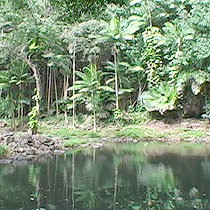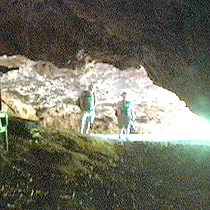2007年VOA标准英语-Hawaii Considered America's Endangered Species
时间:2019-01-11 作者:英语课 分类:2007年VOA标准英语(六月)
By Zulima Palacio
Kauai, Hawaii
18 June 2007
The Hawaiian archipelago represents the most isolated 1 group of islands in the world. Plants and animals that are common to many people elsewhere only made it to these islands in the last few hundred years -- most of them, only in the last few decades. The introduction of thousands of new species, together with increased human activity, have put many Hawaiian species on the endangered list. Producer Zulima Palacio spent a week with a group of scientists who are trying to save Hawaii's bio-diversity. Rosanne Skirble narrates 2 the story.

Steve Perlman spends a lot of time hanging out in remote regions of the Pacific. It is his passion and his work, not a sport. He collects rare plants on the verge 3 of extinction 4.
"I think hospice training would probably help us,” he says, “because we are doing what is called the plant extinction prevention programs and so all the plants in that program, 120 species, have less than 50 individuals."
Perlman works as a field researcher for the U.S. National Tropical Botanical Garden on the island of Kauai. He is an authority on Hawaiian flora 5. He has discovered nearly 30 species and has rediscovered 20 or more that were thought to be extinct. "I have gone back and actually witnessed extinction at least a dozen times, when I go back and the last one is dead. The first time we kind of took our hats off and had a moment of silence."
But he says now the rate of extinction is more common and Hawaii has become "the endangered species capital of the United States."

Large caves on the island of Kauai contain a "library" of information about extinct native plants and animals
Chipper Wichman is the director of the Tropical Botanical Garden. He and his team of scientists are leading the efforts to save Hawaii's rich bio-diversity. "Ninety percent of our dry land ecosystem 6 is now completely gone; our moist ecosystem, 61 percent. Probably the strongest ones are the wet ecosystems 7 in the middle of the island where people don't want to live or develop, is too rough or remote."
Another Tropical Botanical Garden scientist, Michael Wysong, explains why invasive species are a problem. "Everything behind me is schefflera, what some people call octopus 8 trees. This invasion occurred in the last 25 years."
Wysong says schefflera, along with the African tulip and the Waiawi Brazilian tree, have taken over much of Hawaii's natural forest. Their dense 9 root system prevents the native plants from growing.
Still another Botanical Garden scientist, Dave Burney, has studied the Makauwahi Sinkhole, a set of caves and passages that have turned out to be an important archeological site. "About 400 years ago there was a mega tsunami 10 here, some kind of humongous wave that came over this wall and brought huge rocks not associated with the cave environment."
Burney and his wife Lida have worked in the cave for the past 14 years, sifting 11 through mounds 12 of sediments 13. They have found bones of extinct animals and plants. They have found seeds that allowed them to bring back plants that had disappeared. Their findings have allowed him to rewrite some of the natural history of Hawaii.
The director of education for the gardens, Gaugau Tavana, explains why it is important to involve the entire community in trying to maintain nature's balance.
"We are stewards 14 of the land. Stewards of nature and the natural resources that have been given to us; and we are only here for a short period of time. We are going to leave and pass it on to next generations. The question is, what we are going to leave to others to come," asks Tavana.
Holding on to traditions, medicinal plants and hundreds of plants forgotten by many, the Tropical Botanical Garden continues its efforts to save and preserve nature as it was in the past, for many generations to come.
- His bad behaviour was just an isolated incident. 他的不良行为只是个别事件。
- Patients with the disease should be isolated. 这种病的患者应予以隔离。
- It narrates the unconstitutional acts of James II. 它历数了詹姆斯二世的违法行为。 来自辞典例句
- Chapter three narrates the economy activity which Jew return the Occident. 第三章讲述了犹太人重返西欧后的经济活动。 来自互联网
- The country's economy is on the verge of collapse.国家的经济已到了崩溃的边缘。
- She was on the verge of bursting into tears.她快要哭出来了。
- The plant is now in danger of extinction.这种植物现在有绝种的危险。
- The island's way of life is doomed to extinction.这个岛上的生活方式注定要消失。
- The subtropical island has a remarkably rich native flora.这个亚热带岛屿有相当丰富的乡土植物种类。
- All flora need water and light.一切草木都需要水和阳光。
- This destroyed the ecosystem of the island.这样破坏了岛上的生态系统。
- We all have an interest in maintaining the integrity of the ecosystem.维持生态系统的完整是我们共同的利益。
- There are highly sensitive and delicately balanced ecosystems in the forest. 森林里有高度敏感、灵敏平衡的各种生态系统。 来自《简明英汉词典》
- Madagascar's ecosystems range from rainforest to semi-desert. 马达加斯加生态系统类型多样,从雨林到半荒漠等不一而足。 来自辞典例句
- He experienced nausea after eating octopus.吃了章鱼后他感到恶心。
- One octopus has eight tentacles.一条章鱼有八根触角。
- The general ambushed his troops in the dense woods. 将军把部队埋伏在浓密的树林里。
- The path was completely covered by the dense foliage. 小路被树叶厚厚地盖了一层。
- Powerful quake sparks tsunami warning in Japan.大地震触发了日本的海啸预警。
- Coastlines all around the Indian Ocean inundated by a huge tsunami.大海啸把印度洋沿岸地区都淹没了。
- He lay on the beach, sifting the sand through his fingers. 他躺在沙滩上用手筛砂子玩。 来自《简明英汉词典》
- I was sifting the cinders when she came in. 她进来时,我正在筛煤渣。 来自辞典例句
- We had mounds of tasteless rice. 我们有成堆成堆的淡而无味的米饭。
- Ah! and there's the cemetery' - cemetery, he must have meant. 'You see the mounds? 啊,这就是同墓,”——我想他要说的一定是公墓,“看到那些土墩了吗?
- When deposited, 70-80% of the volume of muddy sediments may be water. 泥质沉积物沉积后,体积的70-80%是水。
- Oligocene erosion had truncated the sediments draped over the dome. 覆盖于穹丘上的沉积岩为渐新世侵蚀所截削。